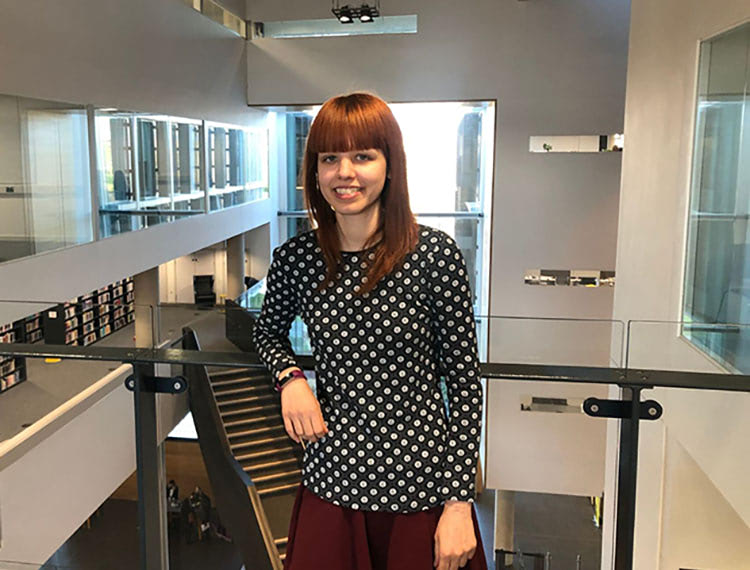Illness didn’t stop Kirstie being a champion Changemaker

A student who spent a significant amount of the pandemic in hospital didn’t let illness get in the way of her leading on a number of projects to help fellow students and University staff.
Kirstie Pope – originally from Huntingdon, Cambridgeshire and pictured at Waterside campus before the lockdown – has just started her MSc in Child and Adolescent Mental Health at the University of Northampton (UON).
A true champion of the University’s Changemaker ethos – an initiative which focuses on staff and students finding solutions to improve people’s lives, either at home or abroad – Kirstie’s extracurricular projects to support her fellow humans would leave many of us struggling to keep up.
During her student years at UON, she has completed the following:
- Created Carers Champions providing students who are also carers information about what support UON and outside agencies provide for them
- Is delivering training sessions for UON lecturers and other staff members in how to better recognise when young carers might be in need of support and how best to help. She was awarded £200 from the University’s Chancellor’s Fund to support with resources
- Produced ‘sunflower’ lanyards for students who have hidden disabilities, identifying why they are not able to wear face masks or face coverings
- Delivered British Sign Language (BSL) training for University staff. Commencing this week, the ‘crash course’ sessions cover the BSL alphabet (or finger signing), key question words, basic pleasantries and standard signs and University specific signs
- She is also the Students’ Union’s Disabled Students Officer. This role involves her fighting for diversity, equality and inclusion across campus and ensuring that the student voice is heard and that all students are getting the support they need.
Her more recent accomplishments are all the more remarkable because Kirstie managed to deliver them whilst spending most of this year in hospital.
She says: “I went into hospital due to complex, chronic, long-term health conditions in February and didn’t come out until mid-September. It all happened quite quickly. I didn’t have wifi access there, so I was solely relying on 4G for everything, but I was determined to keep up to speed on my final undergraduate assignments as well as the very important other projects that I had started – with every expectation of being able to do that from somewhere other than a hospital bed or ward!”
Kirstie’s interest in human behaviour and particularly care-givers and young care-givers started when she was much younger.
She became a full-time carer to her Mum when she was 13, juggling that with the demands of growing up and keeping on top of her education.
Kirstie explains: “I’ve cared for my Mum for more than 12 years now as she needs on-going support with her mental health. Because she doesn’t fit the ‘traditional’ image we have of someone who needs care – such as an elderly person who has dementia – and because I was still in school, I wasn’t seen as a ‘traditional’ carer and I had to jump a lot of hurdles, both for her and myself.
“Young carers are trapped in a Catch-22 situation. They provide a social care service – saving money for social care authorities – but because they don’t work the full number of hours due to being at school or college, we can’t claim certain benefits.
“It was a very frustrating time and trying to find financial support added to the stress, but I’m turning a positive into a negative and putting what I learned to good use at the University.”
Kirstie has received much support from the University of Northampton, something she felt would be forthcoming almost from the outset of her studies here. She adds: “I had a good head start because the University already has a Carers Award in place which grants carers who apply for it £1,000 to help balance their studying with their caring role.
“I remember feeling very surprised and pleased when I found out about it as other universities don’t offer a bursary like it.
“But there is more out there for us – either here or beyond – but either we are too busy to navigate ‘the system’ or are so used to struggling that we just carry on.
“I know I’m not alone as a young carer at university, so Carers Champions is my way of giving something back to make sure these valuable people don’t struggle.
“The University has been super supportive helping me get Carers Champions up and running. They and my lecturers saw my passion to do something good and do it well, especially so during my time in hospital. I doubt I would have stayed/finished my degree anywhere else. It’s been the people who have kept me here.
“They helped make sure I didn’t let my studies slip and that the project will have a long-lasting legacy. And that matters to me the most, that Carers Champions helps and goes on doing that.”
In recognition of her tireless work to support and promote psychology at UON, Kirstie also recently won a UON Psychology team ‘Graham Mitchell Award’. The citation included the following observations about her personality and willpower: “Kirstie is the most resilient person I have ever met…I have been in awe of her courage, bravery and strength of character…she is a fierce feminist and fights for diversity and equality related issues at the University and beyond.”











Responses